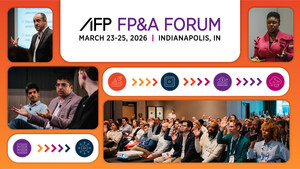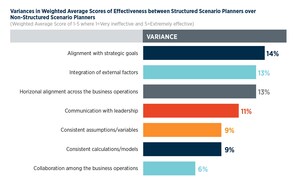
As Corporate Treasury Gets Lean, Good Policies Become Critical
Corporate Treasurers Weigh-In on AFP Treasury Benchmarking Program
WASHINGTON, Sept. 17, 2013 /PRNewswire/ -- Companies are finding ways to run their treasury functions with fewer employees than they had last year, according to a report released today by the Association for Financial Professionals (AFP).
The 2013 AFP Treasury Benchmarking Program Survey, now in its sixth year, found that a typical organization has 4.00 full-time equivalents (FTEs) in its treasury operation for every $1 billion of annual revenue that the organization generates, down from 4.35 FTEs reported in 2012. The benchmark or 80th percentile organization has 1.36 FTEs in its treasury operation for $1 billion of annual revenue, down from 1.46 in the previous survey.
When comparing operational costs of corporate treasury departments, personnel expenses account for three-fifths of the total annual costs for corporate treasury operations. Variances in personnel costs can mean the difference between a good and an excellent or benchmark organization, since many companies are similar in their treasury structure and sophistication of systems.
For cash management activities, the typical organization uses 1.17 FTEs for every $1 billion of annual revenue while the benchmark organization uses 0.39. In 2012, the figures were 1.20 and 0.42 FTEs, respectively.
To manage debt and investments, the typical organization uses 0.71 FTEs for every $1 billion of annual revenue, less than the number of FTEs reported in 2012. The benchmark organization uses 0.25 FTEs for every $1 billion of annual revenue in serving the function compared to the 0.24 FTEs reported in 2012.
"Companies no longer have the luxury of managerial layers," said Jim Kaitz, AFP's president and CEO. "With an ongoing focus on cost-containment, the right policies and procedures are essential when operating a lean treasury."
The 2013 survey also focused on the importance of treasury policies and their impact on risk mitigation, financial performance, regulatory compliance, business continuity and other outcomes. The survey examined four key operational areas typical for centralized treasury functions:
- CASH CONCENTRATION AND FORECASTING - For an overwhelming majority of organizations, having a formal (written) cash concentration and forecasting policy is vital for monitoring and optimizing financial performance. Nearly three quarters of organizations have a policy for this reason. Risk mitigation is also an important factor in a company's cash and forecasting policy. Almost half of organizations review their policies once a year.
- CUSTOMER/VENDOR CREDIT EVALUATION AND APPROVAL - Most organizations have a written customer/vendor credit evaluation and approval policy, with 82 percent citing risk mitigation as the main objective. Almost four out of ten indicate the policy is to ensure regulatory compliance. In two-thirds of organizations, the CFO or an executive management team/committee oversees and reviews credit evaluation policies.
- FOREIGN EXCHANGE (FX) AND INTEREST RATE MANAGEMENT - Of those organizations with a formal, written FX and interest rate management policy, 68 percent feel the policy is critically important, particularly in how it mitigates risk. Almost half of organizations review their FX policy on an annual basis, with the CFO and/or the board of directors having the greatest oversight.
- INVESTMENT MANAGEMENT - Three quarters of financial professionals feel that having a written investment management policy is critically important to their organizations. In more than half of organizations with such a policy, the board of directors has oversight/approval authority and policies are reviewed on an annual basis.
Report highlights and treasury benchmarking data are available on afponline.org/benchmark.
ABOUT THE SURVEY
This is the sixth year of the partnership between AFP and IBM to present benchmark data to financial professionals. The 40-question survey evaluated operational issues for treasury departments that directly affect an organization's success and generated 554 responses. Corporate treasury departments use the AFP Treasury Benchmarking Survey as a basis for comparison with the best of their peers. The report identifies performance levels of participants, analyzes performance by peer group, and defines world-class (80th percentile) targets across key operational areas ranging from processes to personnel to technology.
ABOUT AFP®
The Association for Financial Professionals® (AFP) is the professional society that represents finance executives globally. Headquartered outside Washington, DC, AFP sets the standards for the Certified Treasury Professional® and Certified Corporate FP&A Professional™ credentials. The quarterly AFP Corporate Cash Indicators™ serve as a bellwether of economic growth. The AFP Annual Conference is the largest networking event for corporate finance professionals in the world.
SOURCE Association for Financial Professionals





Share this article